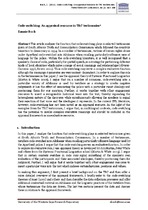Code-switching: An appraisal resource in TRC testimonies
Abstract
This article analyses the function that code-switching plays in selected testimonies given at South Africa's Truth and Reconciliation Commission which followed the country's transition to democracy in 1994. In a number of testimonies, victims of human rights abuse under Apartheid code-switched into Afrikaans when recalling particularly offensive uses of language by the police. Within the code-switching literature, it is well recognised that a speaker's choice of code, particularly for quoted speech, is a strategy for performing different kinds of local identities which index a range of social meanings and relationships (Alvarez-Caccamo 1996, Koven 2001). Thus code-switching may serve a complex evaluative function although the meanings it generates are very context- dependent. In order to explore this role in the testimonies in this paper, I use the appraisal theory of Systemic Functional Linguistics (Martin & White 2005). I argue that on a number of occasions, code-switching into a particular variety of Afrikaans is used by testifiers as a strategy to invoke negative judgement: it has the effect of associating the police with a particular racist ideology and positioning them for our sanction. Further, it works together with other engagement resources to insert a recognisable historical voice into the text, thereby expanding the heteroglossic nature of the discourse while simultaneously allowing the speakers to signal their rejection of that voice and the ideologies it represents. In the current SFL literature, however, code-switching has not been noted as an appraisal resource. In the light of the examples from the TRC testimonies, I argue that, in multilingual contexts, code-switching has the potential to invoke complex evaluative meanings and should be included in the appraisal framework as an evaluative resource.

